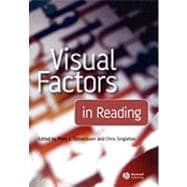
Chris Singleton is a Chartered Psychologist and Senior Lecturer in Educational Psychology at the University of Hull. His main research and professional interests are in the development of literacy and the identification and education of children and adults with dyslexia and other learning problems. He is internationally known for pioneering research that resulted in the development of computer-based systems for screening and assessment of dyslexia, visual stress and other cognitive difficulties, now widely used in schools, colleges and universities in the UK and elsewhere in the world. Dr Singleton is an editor of the Journal of Research in Reading and was chair of the National Working Party on Dyslexia in Higher Education.
| Notes on Contributors | p. vii |
| Preface | p. xi |
| Visual constraints in written word recognition: evidence from the optimal viewing-position effect | p. 1 |
| Pre-schoolers, print and storybooks: an observational study using eye movement analysis | p. 13 |
| Hemispheric division of labour in reading | p. 29 |
| Dissociations between serial position and number of letters effects in lateralised visual word recognition | p. 43 |
| Letter-position encoding and dyslexia | p. 59 |
| The word shape hypothesis re-examined: evidence for an external feature advantage in visual word recognition | p. 87 |
| Integration of the visual and auditory networks in dyslexia: a theoretical perspective | p. 105 |
| The effect of print size on reading speed in dyslexia | p. 117 |
| The relationship between dyslexia and Meares-Irlen Syndrome | p. 135 |
| Visual stress in adults with and without dyslexia | p. 151 |
| Index | p. 165 |
| Table of Contents provided by Ingram. All Rights Reserved. |
The New copy of this book will include any supplemental materials advertised. Please check the title of the book to determine if it should include any access cards, study guides, lab manuals, CDs, etc.
The Used, Rental and eBook copies of this book are not guaranteed to include any supplemental materials. Typically, only the book itself is included. This is true even if the title states it includes any access cards, study guides, lab manuals, CDs, etc.